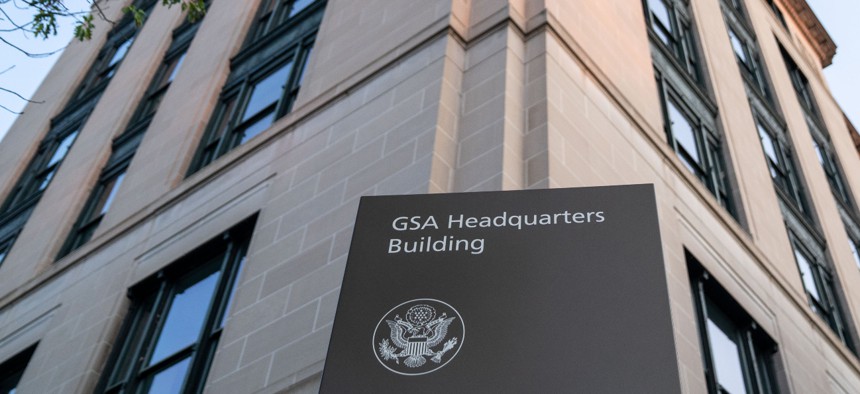
Agencies would be able to rent unused spaces after receiving approval from the General Services Administration. Kent Nishimura / Los Angeles Times via Getty Images
Senators Make Bipartisan Push to Unload or Upgrade Federal Property
Excess federal space could be leased to solar companies or universities, lawmakers say.
Federal agencies would face less red tape in making better use of their excess property or fixing up dilapidated facilities under a pair of bills put forward this week by a group of bipartisan lawmakers.
Federal agencies regularly own property that they do not use but also cannot sell, as a part of their campus or in a facility that they only use part of the year, the lawmakers said. The Saving Money and Accelerating Repairs Through (SMART) Leasing Act, introduced by Sens. Gary Peters, D-Mich., James Lankford, R-Okla., Kyrsten Sinema, D-Ariz., and Josh Hawley, R-Mo., would allow agencies to rent those spaces after receiving approval from the General Services Administration. The revenue generated from the rentals would go to capital projects and maintenance of existing facilities.
“By leasing underutilized public property, federal agencies can reduce costs and raise funds for maintenance and other important projects,” Peters said. “This commonsense, bipartisan bill will not only improve government operations and their delivery of essential services to the American people, but ensure taxpayer dollars are spent effectively and efficiently.”
The measure cleared the Senate in a December vote last year, but that did not leave enough time for the House to pass the bill and send it to President Biden’s desk.
The lawmakers said space could be rented for solar fields, for example, or to universities. GSA would have to sign off that any leased property would not be detrimental to the agency’s mission and would have to be rented out at the market rate. The program would begin as a pilot, with only six leases per year through 2024. GSA would then advise Congress on whether to extend or expand the program. The lawmakers noted that NASA has already launched and found success with a similar program.
“Underutilized federal property is a waste of taxpayer funded resources,” said Lankford, adding the bill “will encourage other agencies to look for ways they can be better stewards of federal property.”
Federal agencies have for years contemplated what to do with excess properties. The Obama administration identified 14,000 excess federal buildings and an additional 55,000 that were under- or unutilized. Obama in 2016 signed into law a measure to require GSA and the Office of Management and Budget to better track unneeded federal buildings and streamline the process for disposing of them. It also created the Public Buildings Reform Board as an independent agency with the sole purpose of reducing the federal government's property inventory.
Lankford led a similar group of senators in introducing a bill to give one agency—Customs and Border Protection—more leeway to fix up the 167 ports of entry in the United States. The bill, introduced with Sinema and Peters, as well Sens. John Cornyn, R-Texas, and Maggie Hassan, D-N.H., would allow CBP to make repairs without approval from GSA for any project valued at less than $300,000. The measure—which similarly won the Senate's approval in the last Congress—would free up GSA to focus on larger projects, the lawmakers said.
GSA received $3.4 billion to build and repair ports of entry from the Infrastructure Investment and Jobs Act that Biden signed into law in 2021. CBP received $330 million under the bill for furniture and equipment. GSA previously announced it would oversee 50 projects related to ports of entry, focusing primarily on “major modernizations” and paving replacements.
Lankford said he has seen first hand that ports need repairs and his bill would help improve working conditions for CBP personnel.
“Bureaucratic red tape has blocked CBP from making those simple fixes to increase border security and better manage trade,” Lankford said. “This bill is a straightforward solution that will ensure our CBP officers have the resources they need to keep the country secure.”







